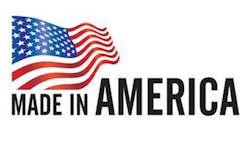It's Time to Rebuild the US Supply Chain Network
Manufacturing in the U.S. is a growing trend. After many years of offshoring, companies are taking a hard look at the benefits of manufacturing closer to their customer base and many are expanding or reshoring production to the U.S.
Additionally, the elevating cost and risk of offshoring production—due to rising offshore wages and complicated, unstable supply chains—has made manufacturing in the U.S. increasingly attractive to global companies and foreign investment. Chinese wages have been going up 15-18% a year and are now high enough for many products to be made more profitably here in America.
Manufacturers today are looking at more than just price when rethinking production locations. In a recent interview, Harry Moser, founder/president of the Reshoring Initiative, said companies must look at the total cost of manufacturing, such as quality, delivery, transportation, innovation and flexibility. These factors, coupled with abundant, low-cost U.S. energy, indicate that manufacturing in the U.S. makes good economic sense for both foreign and U.S. businesses.
According to a recent article in MONEYNEWS reporting on a segment featured on CNBC, Steve Forbes echoed Chicago Mayor Rahm Emanuel’s sentiment when he said, “The cheap natural gas is going to allow us to basically reshore manufacturing.”
Shifting Supply Chain Perspectives
Companies are making strategic shifts to their supply chain models to take advantage of the benefits of manufacturing in the U.S. Companies are weighing the benefits of reshoring due to shifting perspectives on supply chain management and the realities of total landed cost.
An important benefit of sourcing in the U.S. is shorter, leaner supply chains as production moves closer to consumers. The U.S. is the world’s largest market and having the flexibility to quickly respond to customers’ changing demands is essential to companies’ competitiveness.
By producing closer to consumers, manufacturers are able to eliminate the large-run production requirements and sizable inventories common to manufacturing offshore and shorten long, complicated supply chains. Contracting supply chains, removing intellectual property risks, and reaping the benefits of innovation, quality and flexibility are all motivating factors to putting American-made muscle behind sourcing decisions.
What Reshoring Means for Your Supply Chain
Due to the years of offshoring, U.S. supply chains have incurred structural damage. Some U.S. manufacturers have downsized operations or closed because their main client moved offshore. New U.S. supply chains must be rebuilt and managed.
Rebuilding a strong U.S. supplier network will be beneficial on many levels, including benefits to companies, jobs and the U.S. economy as a whole.
Benefits to Companies:
• Streamlined supply chains lead to less disruption.
• Time to market is faster.
• Hidden costs are reduced or eliminated.
• Intellectual property risks are eliminated.
• Companies are finding that when manufacturing and engineering are located near one another, they can improve design, eliminate waste, improve quality and increase productivity.
Creating Jobs:
• As companies expand production operations in the U.S., new employment opportunities will emerge across the U.S. economy.
• Current research shows that if companies use total cost of ownership to calculate their offshoring decisions, 25% of what has been offshored would come back, creating 1 million jobs.
• The manufacturing multiplier effect drives other sectors, creating jobs and investment in non-manufacturing sectors.
The American Economy:
• According to the results of the Grant Thornton Realities of Reshoring survey, as much as 5% overall U.S. procurement may come home. The huge numbers could dramatically impact U.S. trade balances, and should provide an enormous boost to domestic manufacturers, retailers, wholesalers/distributors and service providers
Rebuilding The National Supplier Network
A typical supply chain network may rely on the skills and equipment capacity of hundreds of suppliers. To strengthen and rebuild the U.S. supplier network, companies should consider:
1. Emphasizing productivity and profitability by reviewing systems and processes, reducing costs and improving efficiencies.
2. Improving lean-manufacturing skills to lower costs and improve quality.
3. Partnering with local educational institutions to provide guidance and collaboration for the courses and apprenticeship programs needed to provide the training for the jobs that need to be filled.
4. Collaborating with engineers in the early design stage of product development to optimize the product, lowering costs and improving time-to-market.
5. Embracing new technology and methods that improve productivity and profitability.
To rebuild a strong U.S. supplier network, suppliers must also have the capacity to showcase their capabilities and buyers must be able to easily access qualified American supply chain partners with the capabilities to meet production requirements and time-to-market guidelines.
Resilient supply chains require robust relationships between buyers and suppliers and are imperative for sustainability. The value of collaboration in pursuing supply chain stability can’t be overstated. The alliance between buyers and suppliers should be cultivated and relationships must be based on strong communication.
Revitalizing the U.S. supply chain network will have a game-changing impact on procurement in the U.S. and empower U.S. manufacturers to effectively compete globally.
Engagement in product development and processes, dynamic collaboration and new technology will rebuild the strength of the U.S. supply chain network, support the trend of reshoring and drive sustainable, global competitiveness in American manufacturing.
Frank Russo is CEO and co-founder of Fabricating.com, a cloud-based sourcing marketplace exclusively for American-made custom parts. Before co-founding Fabricating Partners Inc., Russo was instrumental in the development of web-based innovations to connect buyers with suppliers, while serving on the management team at Thomas Publishing Co., McGraw-Hill Construction Information and MFG.com. He has extensive knowledge of metal manufacturing technologies, procurement and supply chain processes, and online marketing techniques.
